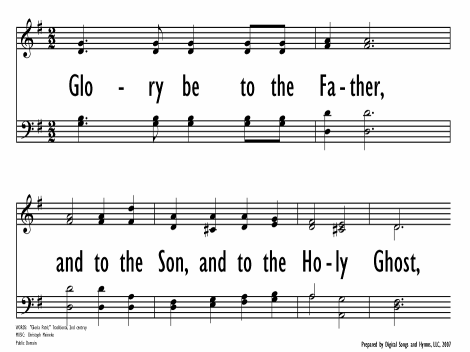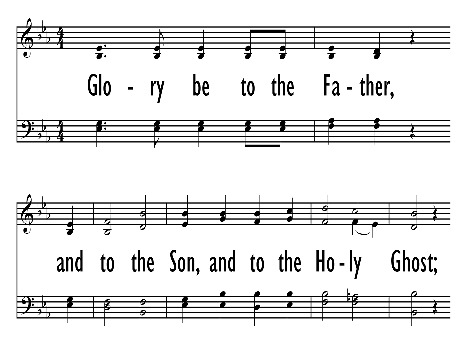- |
User Links
Glory Be to the Father
Hymn Information
- First Line
- Glory be to the Father and to the Son
- Text Source
- Gloria Patri, <cite>The Lesser Doxology</cite>, 2nd c.
- Tune Name
- MEINEKE
- Composer
- Charles Meineke (1844)
- Topic
- Doxologies · Responses: To Scripture · Short refrains
Copyright Information
- Text Copyright
- Public Domain
- Tune Copyright
- Public Domain
- Reprint/Projection Information
- Words and Music: The Words and Music are in the Public Domain; you do not need permission to project or reprint the Words and Music.
Full Text
Scripture References
Further Reflections on Scripture References
The initial part of the Gloria Patri may be traced back to the Trinitarian baptismal formula recorded in Matthew 28: 19; it was probably used by early Christians as an acclamation. The second part, which begins "as it was in the beginning," was added in the fourth century as a response to the Arian heresy. Thus the text reflects the orthodox insistence on the consubstantiality of the Son with the Father and the eternal unity and equality of the three persons in the Trinity.
Confessions and Statements of Faith References
Further Reflections on Confessions and Statements of Faith References
How can the worshiper not conclude with such acclamations! When God is the “overflowing source of all good” (Belgic Confession, Article 1) and when he has provided all the benefits of Christ’s atonement and makes them ours so that “they are more than enough to absolve us from our sins,” (Belgic Confession, Article 22) our hearts cry out to him with praise and adoration. Therefore, Heidelberg Catechism, Lord’s Day 52, Question and Answer 128 includes the ending doxology of the Lord’s Prayer and teaches that “your holy name, and not we ourselves, should receive all the praise, forever.” And so consistent with these thoughts, Our World Belongs to God, paragraph 2 exclaims, “Our World Belongs to God! God is King: Let the earth be glad! Christ is victor: His rule has begun! The Spirit is at work: Creation is renewed! Hallelujah! Praise the Lord!” And the Belhar Confession, Section 5 concludes: “Jesus is Lord. To the one and only God, Father, Son and Holy Spirit, be the honor and the glory forever and ever.”


 My Starred Hymns
My Starred Hymns






